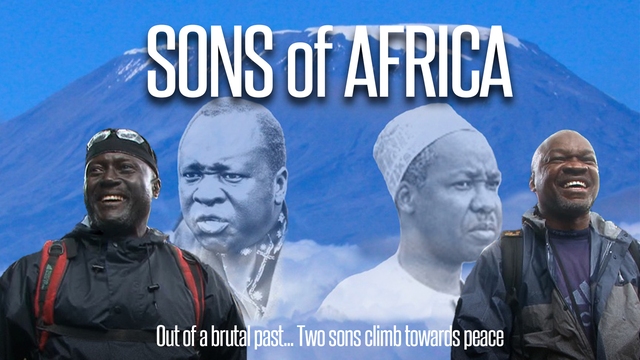In 1979, after a brutal war, the army of Julius Nyerere - founding father of Tanzania - overthrew Ugandan dictator Idi Amin. Now, more than 30 years on, the sons of Idi Amin and Julius Nyerere have come together for a symbolic act of reconciliation: climbing Mount Kilimanjaro together. As Madaraka and Jaffar make their way up to the Roof of Africa, they discuss the way they see one another, the relationships they had with their powerful fathers, and the future of modern Africa.
"Out of the jungle and into the light", Jaffar says with glee. No longer on the gnarled forest floor in the stifling heat, the hiking group have room to breathe. Yet ahead lies more difficulty and danger. Kilimanjaro looms large; inhospitable and deadly. The group now faces vast moorland, dry deserts and an icy wilderness, climbing higher into the oxygen-starved air, where rock falls and deaths are common. Yet as Jaffar's companion says,
"compared to the complexity of history, climbing a mountain is easy". If they can ascend a mountain, can Jaffar and his climbing partner Madaraka also climb out from under their fathers' oppressive legacies?
History has torn their legacies in different directions: one remains a hero of the Pan-African Socialist movement whilst the other is seen as dictator and tyrant. With all that remains of Jaffar's father being the scent of rose water on his prayer beads and a blood stained history, it is hard for him
"to find the courage to stand up and be counted". Similarly, Madaraka has to cope with the comparisons and expectations that come with having a candidate for canonization as a father.
It is under this shared burden that they form an unlikely relationship.
"He has a kojo approach to life just like his Dad!" Jaffar says of Madaraka,
"I feel like I've a lot I can learn." And as their ascent continues up the mountain you can hear in Jaffar's words about his father an echo of Madaraka's philosophy:
"He was using something that was a tried and tested way of ruling Africa and unfortunately that same style of leadership is with us today. We still haven't turned the corner."
In their attempt to touch the Roof of Africa, get to know each other and uncover one another's pasts, these two sons, separated by politics and war, teach us about a region's tangled history. It is, as Jaffar states,
"a quest to discover yourself and how you fit into society". At once compelling, revealing and beautiful, Sons of Africa exists as both an inspiring and enlightening documentary.
LEARN MORE.
WATCH MORE.
JOIN THE DISCUSSION.
 In 1979, after a brutal war, the army of Julius Nyerere - founding father of Tanzania - overthrew Ugandan dictator Idi Amin. Now, more than 30 years on, the sons of Idi Amin and Julius Nyerere have come together for a symbolic act of reconciliation: climbing Mount Kilimanjaro together. As Madaraka and Jaffar make their way up to the Roof of Africa, they discuss the way they see one another, the relationships they had with their powerful fathers, and the future of modern Africa.
In 1979, after a brutal war, the army of Julius Nyerere - founding father of Tanzania - overthrew Ugandan dictator Idi Amin. Now, more than 30 years on, the sons of Idi Amin and Julius Nyerere have come together for a symbolic act of reconciliation: climbing Mount Kilimanjaro together. As Madaraka and Jaffar make their way up to the Roof of Africa, they discuss the way they see one another, the relationships they had with their powerful fathers, and the future of modern Africa.



